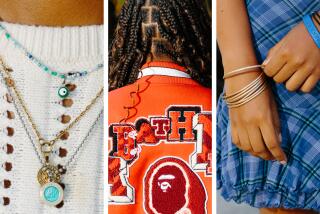World Class : 800 Students in Exchange Program Say Goodbye After Experiencing Life in the U.S.
- Share via
The ranks of the diplomatic corps would be proud of Melina Gudiel and Billie Steiner.
As foreign exchange students, they slept in an igloo, kissed a moose and went halibut fishing during their year in the United States.
“The igloo was comfortable and warm,” recalled Steiner, a 17-year-old German student who lived with a host family in Kenai, Alaska, for nearly a year.
“Our host families thought we wouldn’t make it through the night because it was zero degrees,” noted Gudiel, 18, of Honduras, who also was an exchange student in Kenai. “But we slept until 11 [in the morning].”
The igloo was built by Steiner’s host family on their front lawn to give the students that experience for a night.
The two teenagers were among the 800 students from more than 50 countries wrapping up nearly a year in the western United States on an American Field Service exchange program for high school pupils.
The students, waiting Wednesday for buses to take them to Los Angeles International Airport, sat, stood, talked and cried amid a sea of suitcases on the front lawn of El Segundo High School, their staging ground after they gathered from points across Colorado, New Mexico, Alaska, Arizona, Washington, Oregon, California and elsewhere in the West. Another 2,000 exchange students leave today from Chicago and New York.
Clusters of teenagers snapped pictures, gave each other hugs as their buses departed, and wondered how they were going to readjust to life at home.
Ayako Mie, 17, had gained 20 pounds since arriving last August from Japan. She was wearing baggy denim overalls because nothing else fit. “I like ice cream. I like chocolate. I like everything,” Mie said emphatically as she wiggled her ring-clad toes inside her leather sandals.
“My host family is afraid of her because she eats so much ice cream,” chided Chiara Marchetti, 17, of Italy.
One of Mie’s biggest challenges, besides trying to avoid food, was learning English. During her first weeks here she walked around with a dictionary in her hands.
Piia Elo, an exchange student from Finland, remembered her first encounter with Mie.
“I said ‘hi,’ and she looked it up in the dictionary,” the Finnish teenager recounted with a laugh.
English wasn’t a big hurdle for Leonor Matos-Silva, 18, of Portugal, who attended Sonoma Valley High School in Northern California, although she still can’t say “cucumber.”
Her challenge was learning to accept people whose tongues, eyebrows, navels and other body parts were pierced.
“I am much more open-minded,” she conceded. “I don’t care anymore about how a person dresses or how they look.”
Marchetti, who attended Hamilton High School in West Los Angeles, spent several years studying English. But she learned British English, not American English, which created its own set of hazards.
When she asked a girlfriend for a rubber, which is the British word for eraser, she got a perplexed look. And when she called a rooster a cock, she got a quizzical stare from her host mother.
The year in the United States will be a lifelong memory that will change every student’s life, said Keith Otterberg of the American Field Service, which has been organizing high school student exchange programs since 1947. This year the agency sent 1,833 American students between the ages of 15 and 18 to foreign countries while 2,828 students came to the United States.
*
“This experience won’t fully hit them until years later,” Otterberg said. “They will see it was one of the most transforming experiences they will ever have.”
During the past year, students learned to become more relaxed and fell into the informality of American life.
They also learned to answer silly questions, such as whether they have electricity and refrigerators in their homes.
And no, California isn’t like the television show “Beverly Hills 90210,” which is broadcast around the world.
They said they will miss the close ties they have formed while learning about a new culture.
Elo won’t forget about playing a game with her swimming teammates at Venice High School in which the girl team members kidnapped the boy team members in the middle of the night and took them to breakfast.
Stefan Lindemann, 17, of Germany, who attended University High School in Irvine, won’t forget becoming tongue-tied when he met former Soviet leader Mikhail Gorbachev in San Francisco last year at a State of the World Forum. He presented the leader with his idea of starting a worldwide youth conference to map out a strategy for the future.
And Gudiel won’t forget three of the best things she discovered this year: new friends, a new family and blueberry muffins.
More to Read
Sign up for Essential California
The most important California stories and recommendations in your inbox every morning.
You may occasionally receive promotional content from the Los Angeles Times.










